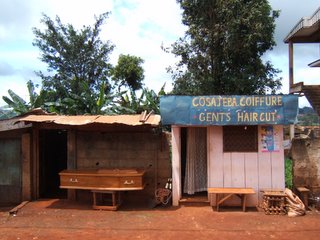basic sociolinguistics

As some of you know, I frequent a cafe in Bangangte where I've made friends with other regulars and the staff. Incidentally, it's a chain - the Cameroon version of Second Cup and Starbucks. Anyway, I often go there with my language books and study in the cafe. This has the fortuitous affect of stimulating conversation about language among whoever is present. In other words, it's a great source of public data.
A theme that comes up very often is that of "real Medumba" and its absence. There's considerable negativity among people I know towards the way they speak. I've never heard anyone list themselves among the speakers of "real Medumba". There is much derision of the Medumba spoken daily on the streets of Bangangte. One person went so far as to call it Pidgin English, which, from the perspective of academic linguistics, is way out there!
Several people have told me that "real Medumba" is spoken in one of the nearby smaller towns and villages. But not everyone chooses the same village. Some people just say the villages in general are where you hear "real Medumba." The dialect that was chosen for standardization is one of these village dialects.
For some people, the past is the location of "real Medumba." Many of these derogatory comments about the Medumba you'd hear in Bangangte are accompanied with mini-laments for the loss of things; young people don't really speak "their language"; they're not interested in "traditional" music anymore; Medumba's lexicon is shrinking because people just borrow from French all the time. In other words, there's a language shift project waiting to be done here. In fact, a colleague of mine working in Accra, Ghana who recently visited Cameroon's capitol told me he was struck by how much he heard French. Apparently, in Accra, locals rarely if ever use colonial languages amongst themselves.
A notable absence from these valuation exercises is the crediting of actual people with speaking "real Medumba". It's always places. No one has yet said to me, "such and such individual I can point to speaks 'real Medumba'". Maybe I'm splitting hairs here, but when my friends mention a village, they don't say "people in Bangoulap speak 'real Medumba'". They say "you'll hear 'real Medumba' if you go to Bangoulap." I don't know, but it could be significant. We'll see.
I'm eager to start hearing people's commentary on the Medumba sung during reunion music. Is it "real" or not? Is that opposition inapplicable because reunion music is a different genre, perhaps? Do aspects of context make reunion singing above reproach (i.e., this is "tradition" time, so everything that goes on during reunion is a fortiori positive) despite possible formal similarities with the reviled speech of everyday life?
3 comments:
not so anonymous...
simon: i don't have your email address, i don't think (or i have the old one, maybe), and i don't want to lose touch. when you read this, email me at
goodsoldier@hotmail.com
then i'll give you my actual email. if your university email is still active, then disregard. either way, email me, man!
by the way, i've read this blog and... it's gooood!
not so anonymous...
simon: i don't have your email address, i don't think (or i have the old one, maybe), and i don't want to lose touch. when you read this, email me at
goodsoldier@hotmail.com
then i'll give you my actual email. if your university email is still active, then disregard. either way, email me, man!
by the way, i've read this blog and... it's gooood!
Hi Simon, I ran into your Mom at the library and she gave me this site. Great to see what you are up to. Write if you have time: fournier119@hotmail.com
Mary Billinghurst
Post a Comment